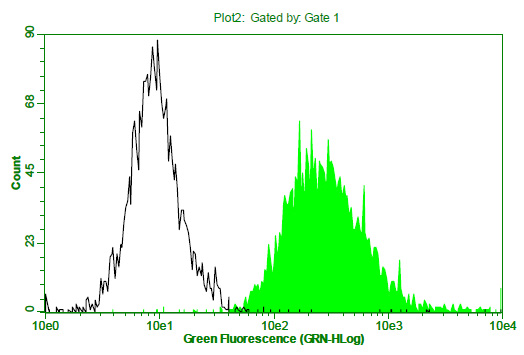Colorectal Carcinoma/CD3 (Bispecific) Mouse Monoclonal Antibody [Clone ID: BS-1]
CAT#: AM09249PU-N
Colorectal Carcinoma/CD3 (Bispecific) mouse monoclonal antibody, clone BS-1, Aff - Purified
Specifications
| Product Data | |
| Clone Name | BS-1 |
| Applications | ELISA, FC |
| Recommended Dilution | ELISA: The bispecific antibody has been shown to detect the presence of the tumor-associated antigen in the serum of patients with colorectal carcinoma, and reacted with mucin-like oncofetal pancarcinoma antigen, glycoprotein TAG-72. Fluorescence Flow Cytometry. |
| Reactivities | Human |
| Host | Mouse |
| Clonality | Monoclonal |
| Immunogen | The original CRC mAb (Y94) used human colorectal carcinoma as immunogen. The original CD3 mAb (JXT3) used human peripheral T lymphocytes as immunogen |
| Specificity | This Hybrid bispecific CRC/CD3 antibody recognizes Human colorectal carcinoma antigen (CRC)/CD3 molecule on Human T cells. This is a bispecific antibody produced by fusion of two hybridoma cell lines. The Human colorectal carcinoma antigen (CRC) mAb secreting cell line was transfected by mpSV2gpt. The human CD3 mAb secreting cell line (JXT3) was transfected by mpSV2neo. The somatic fusion between CRC and JXT3 cells produced quadroma CRCgpt/CD3neo, which were selected and cloned in media containing both Mycophenolic acid and Geneticin. Quadromas showing both murine IgG1 and IgG2a was subcloned for bispecific antibody CRC/CD3 production. |
| Formulation | 0.01M PBS, pH 7.0 without preservatives State: Aff - Purified State: Lyophilized purified IgG fraction |
| Reconstitution Method | Restore with Double distillated water to adjust the final concentration to 1.0 mg/ml. |
| Purification | Affinity Chromatography on Protein G |
| Conjugation | Unconjugated |
| Storage | Upon receipt, store undiluted (in aliquots) at -20°C. Avoid repeated freezing and thawing. |
| Stability | Shelf life: one year from despatch. |
| Background | Colorectal carcinoma is the cancer developed in the colon or rectum of the digestive system. In developed countries, it is the most common cancer in aging population. Genetic deposition and a less active life style contribute to the development of the cancer. Molecular pathological study showed that altered Wnt-APC-β-catenim signaling pathway, mutated p53, and deactivated TGF-β and DCC (Deleted in Colon Cancer) are involved with the pathogenesis. The cancer is currently screened with a fecal occult blood test in people over 50 years old and the malignancy is confirmed by tumor biopsy. The search for specific biomarker for non-invasive test is still ongoing. CD3 exists on the cell surface of all T-cell types. It is used for differentiating Tcells from other leukocytes such as B cells and natural killer cells. CD3 is the accessory molecule in the T cell receptorcomplex. In the presence of CD3 and ζ- chain, T-cell receptor binds to antigen presented by MHC and transfers signal for T-cell activation. The hybrid bi-specific antibody binds to CD3 and colorectal carcinoma related antigen at its two different Fabs. Theoretically, the bi-specific antibody brings the target cancer antigen near Tcells and could enhance T-cell mediated immunity to cancer. However, if the binding to CD3 disrupts the CD3’s accessory function, T-cell immunity suppression could be resulted. |
| Synonyms | CRC/CD3, Hybrid bispecific antibody |
| Reference Data | |
Documents
| Product Manuals |
| FAQs |
| SDS |
{0} Product Review(s)
0 Product Review(s)
Submit review
Be the first one to submit a review
Product Citations
*Delivery time may vary from web posted schedule. Occasional delays may occur due to unforeseen
complexities in the preparation of your product. International customers may expect an additional 1-2 weeks
in shipping.






























































































































































































































































 Germany
Germany
 Japan
Japan
 United Kingdom
United Kingdom
 China
China



